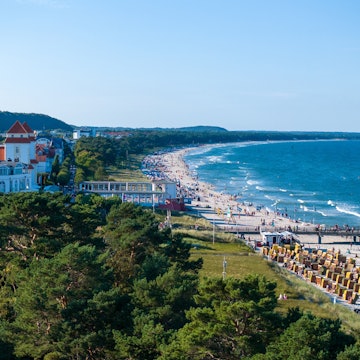

Traditional Polish cold beetroot soup in a bowl on a tablecloth with a napkin. Geo-grafika / Getty Images
There’s more to Polish food than dumplings and stuffed cabbage, and the average meal is neither boring nor predictable. The world opened up to Poland in the last half century, and local chefs have challenged themselves to update traditional recipes with new ingredient combinations and methods of preparation. Here's our guide to the flavours of Poland.

Regional delicacies
Specialities vary quite a bit from the northern, Baltic Sea area, to the southern, mountainous part of Poland. Freshwater fish dishes rule the north. Herring in oil is served as a starter; herring in cold sour cream over hot potatoes is often the main dish. There's also paprykarz, a white fish dish with veggies and rice, and white fish in gelatine with beets.
Aromatic roasted duck is a national delicacy and can be found in all corners of the country. Every region claims theirs is the best because of the stuffing: veal with giblets in the Wielkopolska region; wild mushroom in the Kujawy region; dried plums in Mazovia or buckwheat and walnuts in the far east. Duck will most likely be served with a potato dumpling of a regional variety, and a serving of a sweet and sour hot red cabbage dish made with raspberries or cranberries. Definitely add this one to your list of dishes to try.
I couldn’t call myself a Pole if I didn’t mention pierogi. There are countless varieties, and they also differ from region to region. Depending on where you are, try a few savoury fillings, like potato and cheese, or sauerkraut and mushroom, and then a few sweet fillings: blueberry or strawberry, or sweet cheese topped with sour cream and sprinkled with sugar.
Soups
Due to the varying availability of ingredients, making soup out of “nothing” is an art in Poland, resulting in a variety of soups like you’ve not seen anywhere in the world. Try as many of these as you can:
Kwaśnica: a sauerkraut soup made with pork (ribs) and potatoes, famous in the mountain region
Barszcz ukraiński: a beet soup full of a variety of vegetables
Goose soup: served with dumplings or noodles
Flaki: an aromatic tripe soup, made with beef stomach, because nothing goes to waste
Zupa grzybowa: a wild mushroom soup using seasonal mushrooms picked and dried locally (the season runs from late August)
Chłodnik: a cold beet soup served only in the hot-weather months made of beets, fresh cucumbers, radishes and refreshing fresh dill.

Street food
When it comes to street food, there are some uniquely Polish snacks to sample on the go, and "fast food" takes on a whole new meaning. Look out for the following:
Zapiekanka: an open-faced baguette served with a variety of meats, vegetable and sauces
Tosty: a thin baguette filled with cheese and mushrooms, prepared in the same way as a panini
Pasztecik: a fried savoury pastry filled with meat, cheese or mushrooms accompanied by a cup of beet broth
Obwarzanek: a round savoury pastry, a cross between a pretzel and a bagel, topped with poppy or sesame seeds, or salt. Most often found in the Kraków area, but occasionally sold elsewhere
Oscypek: smoked sheep’s cheese formed into distinct shapes, such as knots, flowers or zigzags. This dish originated in the mountain areas, but is now available countrywide
Kebab: although originally from the Middle East, this street food evolved to match Polish palates and is as unique and original as any other regional food. This late-night snack first appeared in the 1990s and fast became a favourite among young Poles. It's made of a variety of meats – chicken, pork or beef – topped with fresh, sliced cabbage, carrots, onions and pickles, served in triangular bread-like pastry.

Bar mleczny (milk bars)
The bar mleczny, or milk bar, is a place where you're served traditional Polish food, and lots of it. It originated as a cafeteria-style bistro in the late 1800s and was heavily subsidised by the government, with the intention of feeding the working class of the post-war era. There aren’t as many milk bars as there were, but those still around remain affordable and attract hungry customers from all walks of life. It’s a place where you can experience a hearty home-cooked meal fast, at a fraction of the price you’d expect.
Sweets
When visiting a Polish bakery or a cafe, you can clearly see that the nation has developed a major sweet tooth. There are so many to choose from: yeast poppy seed rolls, sweet cheese buns, torts, fruitcakes, cheesecakes, apple cakes, ginger cookies, sugar cookies, cream cakes, layered cakes, meringue cakes, and donuts. Good luck selecting only one!
For the adventurous foodie
Poland has plenty of options for more adventurous palates, and many of these are available in traditional Polish restaurants:
Smalec: served as an appetiser, fried pork fat often mixed with sautéed onions and apples, topped with crackling and spread on large hunks of bread
Nóżki w galarecie: jellied calves’ trotters prepared with aromatic vegetables and herbs, served with a splash of vinegar and a dollop of spicy horseradish
Kaszanka: seasoned pork and buckwheat blood sausage, often served with sautéed onions and mustard
Pasztet: meat pâté with duck, pork, chicken, turkey, or rabbit liver (or a combination) served as an appetiser or a sandwich topping, often presented with fresh onions and pickles
Czernina: aromatic duck-blood soup prepared with dried fruit and spices, served with egg noodles. It’s not easy to find, but if you do, and you consider yourself a foodie, you must try it.
You might also like:
How to spend a perfect weekend in Kraków
Everything you should see and do on a trip to Warsaw
Top 10 things to do in Poland
Article first published in April 2012, and last updated by Anna Hurning in January 2020






















